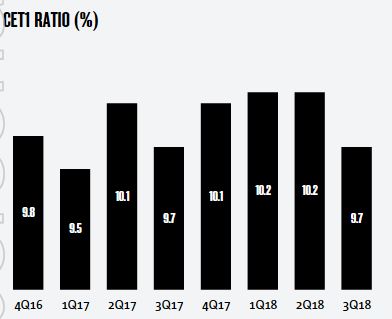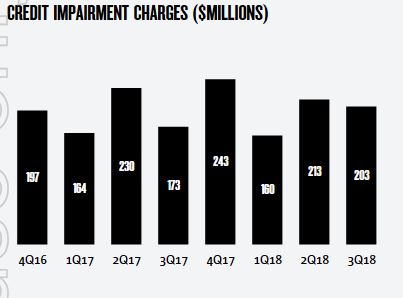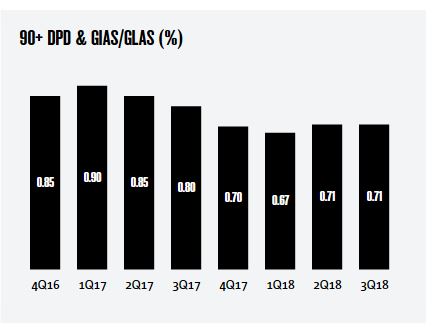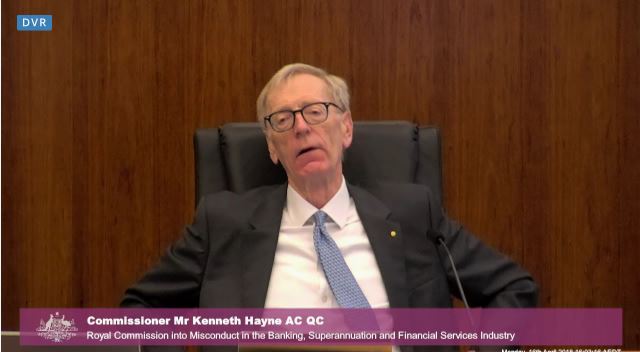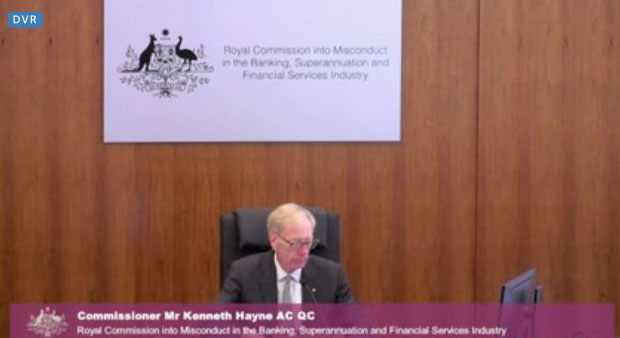Yesterday’s royal commission hearings began with a ruling by commissioner Kenneth Hayne on NAB’s application to prevent seven documents from being published.
The ruling came after a fiery exchange on Wednesday afternoon in which an angry commissioner Hayne warned NAB counsel Neil Young not to “direct” NAB witness Nicole Smith.
One of the seven documents ruled on yesterday was a document from ASIC entitled ‘Outline of Suspected Offending by the NAB Group’.
“The parts of the document for which the direction is sought concern ascertaining the extent of the charging of fees for no service and what approach should be adopted for compensating those who have been charged,” said the commissioner.
Mr Hayne said he would need to weigh up the “balance” between the interest of an individual, the public interest, and NAB’s legitimate desire to protect private commercial interests.
“In attempting to strike the balance that is to be drawn between those competing elements, it is to be noted that it would be in the interests of NAB to pay the least sum available by way of remediation,” Commissioner Hayne said.
“It would be in the interests of persons charged fees, in circumstances where no service has been provided, to be provided with adequate compensation.
“It is in the public interest that there be an open and transparent inquiry about how both the regulator and the regulated deal with the issue of remediation,” he said.
For those reasons, said the commissioner, “the application for non-publication is refused”.
Counsel assisting Michael Hodge then stood up at the bench to reject comments by Mr Young on Wednesday afternoon that “might be taken to be an implicit criticism of the staff of the royal commission”.
“You were also told, commissioner, in relation to the outline of contraventions from ASIC that I was taking Ms Smith to, that the National Australia Bank had not been notified that this document would be the subject of publication. That is incorrect,” Mr Hodge said.
“There was no fault on the part of the staff of the commission or the solicitors assisting the commission, and that everything has occurred in accordance with the practice guidelines that have been published by you in February of this year,” he said.
Mr Hodge went on to describe the tardiness with which NAB had supplied documents requested by the royal commission.
NAB produced 31 documents on 9 July 2018 following a request by the commission for documents relating to NULIS and ‘fees for no service’, said Mr Hodge.
“After that date, the National Australia Bank produced in excess of three and a half thousand documents regarding the ‘fees for no service’ issue, of which in excess of 3000 were produced to the commission last week,” he said.
In respect of the seven ASIC documents commissioner Hayne ruled on yesterday morning, four were produced to the royal commission on the afternoon of 3 August 2018 and three were never produced by NAB, said Mr Hodge.
“It may be that, unfortunately, that particular manner of responding to your compulsory notice has contributed to some of the difficulties that the National Australia Bank has faced in dealing with these confidentiality claims,” Mr Hodge said.
Mr Hodge uncovered at least 100 instances of potentially criminal breaches by NAB in his subsequent examination of the seven ASIC documents and his questioning of Ms Smith.
NAB chief executive Andrew Thorburn made a public apology for NAB’s “failure to act with honour” via a video posted on Twitter late on Thursday afternoon.





